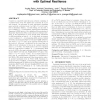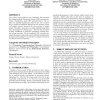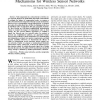347 search results - page 37 / 70 » On private computation in incomplete networks |
PODC
2009
ACM
14 years 8 months ago
2009
ACM
Consider a completely asynchronous network consisting of n parties where every two parties are connected by a private channel. An adversary At with unbounded computing power activ...
ACMICEC
2008
ACM
13 years 9 months ago
2008
ACM
Prior theory and empirical work emphasize the enormous free-riding problem facing peer-to-peer (P2P) sharing networks. Nonetheless, many P2P networks thrive. We explore two possib...
JSAC
2006
13 years 7 months ago
2006
Abstract-- Node compromise is a serious threat to wireless sensor networks deployed in unattended and hostile environments. To mitigate the impact of compromised nodes, we propose ...
ADHOCNOW
2004
Springer
14 years 1 months ago
2004
Springer
Supporting nodes without Global Positioning System (GPS) capability, in wireless ad hoc and sensor networks, has numerous applications in guidance and surveying systems in use toda...
ICCAD
1993
IEEE
13 years 12 months ago
1993
IEEE
Current approaches to compute and exploit the flexibility of a component in an FSM network are all at the symbolic level [23, 30, 33, 31]. Conventionally, exploitation of this ï¬...



